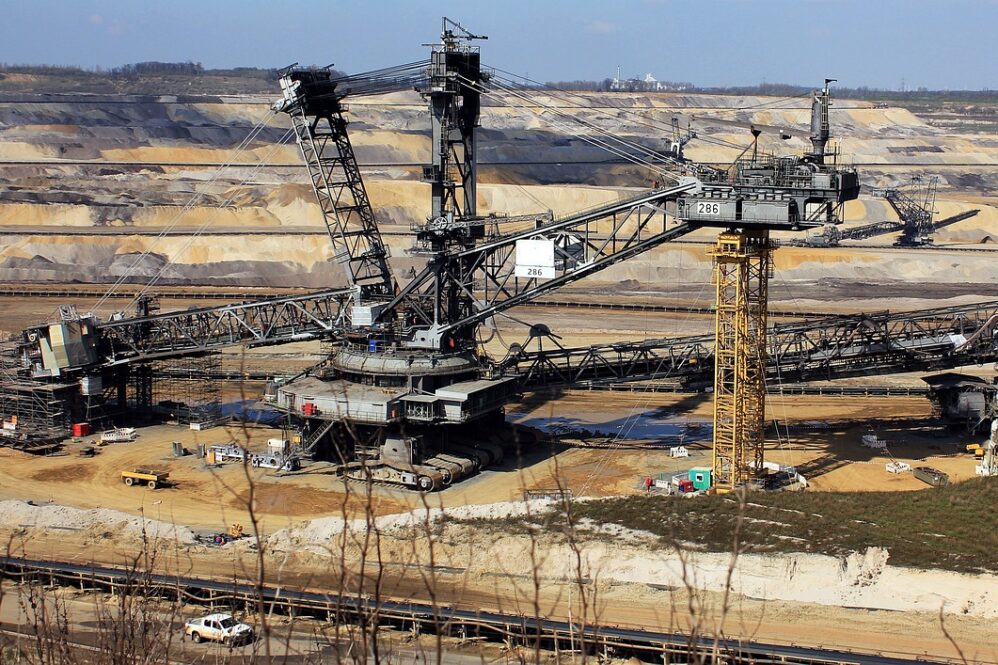Nigeria, often referred to as the “Giant of Africa,” is not only known for its cultural diversity and vibrant population but also for its vast reserves of natural resources. With a landscape that is richly endowed with an array of minerals, Nigeria stands on the brink of a tremendous opportunity for economic growth and development through its mining sector. In this blog post, we will delve into the remarkable potential that lies within Nigeria’s mineral deposits and explore the significance of tapping into these resources.
In the following sections of this blog post, we will explore the historical journey of Nigeria’s mining sector, examine the potential environmental concerns associated with mining activities, discuss the technological advancements that are shaping the industry, and delve into the government policies that are shaping the present and future of mining in Nigeria. Stay tuned as we uncover the layers of this fascinating and critical facet of Nigeria’s economy.
Nigeria’s Mineral Wealth
Diving deeper into the heart of Nigeria’s mineral wealth, it’s evident that the nation’s geology has bestowed it with a bountiful assortment of valuable resources. These resources can be broadly categorised into two main groups: hydrocarbons and solid minerals.
Hydrocarbons: Oil and Natural Gas
Nigeria’s oil and natural gas reserves have long been the backbone of its economy. The country ranks among the top oil-producing nations globally. The Niger Delta region, in particular, is known for its abundant oil reserves. Crude oil not only fuels the nation’s energy needs but also constitutes a significant portion of its export revenue. The exploration and production of oil have enabled Nigeria to establish its presence on the international stage, both economically and geopolitically.
Solid Minerals: A Diverse Abundance
The solid mineral deposits in Nigeria are remarkably diverse, ranging from metallic minerals to industrial minerals. Some of the notable solid minerals include:
Tin:
Nigeria was a significant global tin producer in the 20th century, and although its prominence has diminished, tin still remains an important mineral.
-Iron Ore:** The country boasts substantial iron ore reserves, particularly in the Itakpe-Ajaokuta region, which presents opportunities for steel production.
Limestone:
Used in construction, cement production, and various industrial applications, Nigeria’s limestone deposits are extensive.
Gold:
Though gold mining has historically been limited, recent efforts have been made to tap into this precious resource.
Coal:
Nigeria has substantial coal deposits, primarily used for energy generation and industrial processes.
Gemstones:
The country also holds potential in gemstone mining, with deposits of aquamarine, topaz, and sapphire.
These mineral deposits, if harnessed responsibly and strategically, have the potential to transform Nigeria’s economic landscape. Not only can they provide a diversified revenue stream for the government, but they also offer opportunities for job creation, technological advancement, and infrastructure development. As the world moves towards cleaner and more sustainable practices, Nigeria’s vast solid mineral reserves could play a crucial role in meeting global demands while ensuring environmental responsibility.
Historical Perspective
To truly understand Nigeria’s current status as a mineral-rich nation, it’s imperative to trace the historical trajectory of its mining activities. The nation’s mineral exploration journey has been shaped by a complex interplay of colonial influence, post-independence challenges, and regulatory measures.
Colonial Influence and Early Mining Activities
Nigeria’s mineral resources attracted the attention of colonial powers, who recognized their potential for economic gain. During the colonial era, mining activities were primarily geared towards the extraction of tin and columbite (a source of niobium and tantalum) in Jos and its environs. These minerals were in high demand for industrial purposes, leading to the establishment of mining operations under foreign control.
Post-Independence Challenges and Regulations
Following Nigeria’s independence in 1960, the mining sector faced numerous challenges. The focus on oil production led to a decline in attention towards other minerals, resulting in outdated mining practices and infrastructure. Additionally, a lack of clear regulatory frameworks and adequate investment stifled the growth of the sector.
Recognizing the need to harness the nation’s mineral wealth for sustainable development, Nigeria implemented a series of reforms aimed at revitalising the mining sector. The Nigerian Mining Corporation was established to oversee the exploration and development of solid minerals. However, these efforts faced significant hurdles, including bureaucratic red tape, inadequate funding, and a lack of modern technology.
In recent years, Nigeria has taken steps to address these challenges and attract both domestic and foreign investment in the mining sector. Reforms and policies have been introduced to streamline processes, encourage private sector participation, and promote responsible mining practices.
Potential Economic Impact
The mineral-rich landscape of Nigeria holds the promise of a significant economic windfall. The extraction and utilisation of these valuable resources have the potential to trigger a range of positive economic impacts, shaping the nation’s growth trajectory and improving the livelihoods of its people.
Boosting Gross Domestic Product (GDP)
One of the most compelling aspects of Nigeria’s mineral wealth is its potential to contribute substantially to the Gross Domestic Product (GDP). By diversifying the economy away from heavy reliance on oil, the nation can create a more resilient economic foundation. The revenue generated from mineral exports and related industries can help stabilise the economy, reducing its vulnerability to oil price fluctuations and external shocks.
Job Creation and Employment Opportunities
Mining activities have the capacity to generate a substantial number of jobs across various stages of the value chain. From exploration and extraction to processing, transportation, and marketing, the mining sector has the potential to employ a diverse workforce. This includes not only skilled workers such as geologists and engineers but also manual labourers, thereby contributing to reducing unemployment rates and improving livelihoods.
Revenue Generation for Government and Communities
The revenue generated from mining activities can significantly bolster government coffers, enabling investments in critical sectors such as infrastructure, healthcare, education, and social services. Additionally, when managed responsibly, mining can provide benefits to local communities. By incorporating a fair and transparent revenue-sharing mechanism, communities can benefit from the wealth generated by their surroundings, leading to improved living conditions and quality of life.
However, it’s important to note that while the potential for economic growth is vast, responsible and sustainable practices are crucial. The negative environmental and social consequences that can result from unchecked mining activities must be carefully mitigated through comprehensive regulations, technology adoption, and community engagement.
Environmental Concerns and Sustainability
While the promise of economic growth through mining is undeniable, it’s essential to acknowledge the potential environmental impacts that can arise from unchecked resource extraction. Nigeria’s journey to harness its mineral wealth must be accompanied by a strong commitment to environmental stewardship and sustainable practices.
Ecological Impact of Mining
Mining activities can have far-reaching consequences for the environment. Habitat destruction, soil erosion, water pollution, and air pollution are some of the adverse effects that can result from irresponsible mining practices. Particularly concerning is the phenomenon of “resource curse,” where regions rich in minerals may paradoxically experience reduced economic development due to environmental degradation and social conflicts.
Regulations for Responsible Mining
To mitigate these risks, regulatory measures are paramount. Nigeria has made strides in this direction by enacting laws and policies that promote responsible mining. Environmental impact assessments (EIAs) are now mandatory for mining projects, ensuring that potential ecological consequences are thoroughly evaluated before any operations commence. These assessments facilitate the identification of potential risks and the implementation of mitigation strategies.
Initiatives for Sustainable Mining
In addition to regulations, various initiatives and partnerships have emerged to promote sustainable mining practices. Collaborative efforts between the government, industry players, and non-governmental organisations (NGOs) aim to raise awareness about environmental concerns, provide training on responsible practices, and encourage the adoption of modern technologies that minimise ecological footprints.
Technological Innovation for Sustainability
Technological advancements are playing a crucial role in addressing environmental concerns. Innovations in mining equipment, waste management, and ore processing are reducing the impact of mining on ecosystems. Techniques such as remote sensing and GIS (Geographic Information Systems) are being utilised for efficient resource exploration and monitoring.
Technological Advancements in Mining

The mining landscape in Nigeria is undergoing a transformation driven by technological innovations that are reshaping how resources are explored, extracted, and processed. These advancements are not only enhancing operational efficiency but also contributing to the industry’s sustainability and responsible practices.
Modern Mining Techniques
Modern mining techniques are revolutionising the way mineral resources are extracted from the earth. Traditional methods that were resource-intensive and environmentally disruptive are being replaced by more efficient and eco-friendly approaches. For example, open-pit mining is giving way to underground mining methods that have a lower impact on the surrounding environment.
Exploration and Resource Estimation
Advancements in geospatial technology, such as Geographic Information Systems (GIS) and remote sensing, have revolutionised resource exploration. These technologies allow for accurate mapping of geological formations, identification of potential resource-rich areas, and estimation of reserves without extensive physical intrusion. This not only saves time and resources but also minimises the disruption to ecosystems.
Automation and Robotics
Automation and robotics are becoming integral to mining operations. Autonomous vehicles and machinery are used in various stages of the mining process, including drilling, hauling, and transportation. This not only improves safety for workers but also enhances efficiency by reducing human error and optimising workflows.
Environmental Monitoring and Management
In the pursuit of sustainable mining, advanced monitoring systems are being employed to track environmental indicators such as air quality, water quality, and noise levels. Real-time data collection and analysis help mining companies make informed decisions to mitigate potential negative impacts and ensure compliance with environmental regulations.
Waste Management and Reclamation
Modern mining practices are placing a strong emphasis on waste management and land reclamation. Innovative techniques for waste disposal, recycling, and land rehabilitation are minimising the long-term environmental footprint of mining activities. Reclaimed lands are being restored to their natural state or repurposed for alternative uses, ensuring that the ecosystems affected by mining activities are rejuvenated.
Challenges Facing the Mining Sector
While the potential benefits of mining in Nigeria’s mineral-rich landscape are immense, the industry is not without its fair share of challenges. From infrastructural limitations to regulatory hurdles, navigating these obstacles is crucial for the sustainable development of the sector.
Infrastructural Limitations
A significant challenge facing the mining sector in Nigeria is the lack of adequate infrastructure. Insufficient transportation networks, energy supply, and communication facilities can hamper the efficiency of mining operations. To fully tap into the mineral wealth, substantial investments in infrastructure are required to facilitate the movement of resources and equipment.
Regulatory and Bureaucratic Hurdles
Navigating the regulatory landscape can be a complex endeavour for mining companies. Bureaucratic hurdles, including lengthy permitting processes and unclear regulatory frameworks, can lead to delays and discourage potential investors. Streamlining these processes and providing clear guidelines are essential for attracting both domestic and foreign investment.
Artisanal and Small-Scale Mining Challenges
Artisanal and small-scale mining (ASM) play a significant role in Nigeria’s mining sector, contributing to livelihoods and local economies. However, ASM activities often operate in an informal and unregulated manner, leading to environmental degradation, unsafe working conditions, and limited access to financing and technology. Balancing the need for regulation with supporting the livelihoods of these miners presents a delicate challenge.
Environmental Concerns
The pursuit of responsible mining practices requires a delicate balance between economic development and environmental protection. Ensuring that mining activities are conducted in an environmentally sustainable manner demands robust regulations, effective monitoring systems, and stringent enforcement mechanisms to mitigate negative ecological impacts.
Community Engagement and Social Responsibility
Engaging local communities and addressing their concerns is vital for sustainable mining. Ensuring that mining activities respect the rights and interests of communities, providing fair compensation, and contributing to local development are essential components of responsible mining. Failure to do so can lead to social conflicts and hinder the success of mining projects.
Despite these challenges, Nigeria’s determination to leverage its mineral wealth for economic growth is evident in various governmental initiatives and policy reforms.
Government Initiatives and Policies
In the quest to tap into Nigeria’s rich mineral deposits and ensure the sustainable growth of the mining sector, the government has introduced a series of initiatives and policies aimed at attracting investment, promoting responsible mining practices, and fostering a conducive environment for industry development.
Attracting Foreign Investment
Recognizing the importance of foreign investment, Nigeria has taken steps to create an environment that appeals to international mining companies. The government has implemented measures to simplify bureaucratic processes, offer tax incentives, and provide clear regulatory frameworks that instil confidence in investors. These efforts are vital in attracting the capital and expertise needed to develop the sector.
Mining Reforms and Policy Updates
Nigeria has undertaken significant reforms to modernise the mining sector. The National Integrated Mineral Exploration Project (NIMEP) was launched to provide up-to-date geological data, enabling accurate resource estimation and investment decisions. Furthermore, the Minerals and Mining Act of 2007 was revised to align with global best practices, addressing issues related to environmental protection, community engagement, and resource management.
Local Content Development
To ensure that local communities benefit from mining activities, the government has introduced policies aimed at increasing local content in the industry. By encouraging the use of locally manufactured equipment, promoting employment of Nigerian citizens, and supporting local businesses, the government seeks to amplify the positive impact of mining on the domestic economy.
Mining Community Development
Recognizing the importance of community engagement, the government has established guidelines for corporate social responsibility (CSR) activities by mining companies. These guidelines outline how mining operations should contribute to community development, including infrastructure projects, education initiatives, healthcare facilities, and other measures that improve the well-being of local residents.
Sustainable Mining Practices
To address environmental concerns, the government is actively promoting sustainable mining practices. Stricter environmental regulations, mandatory Environmental Impact Assessments (EIAs), and efforts to enforce compliance are all steps taken to ensure that the industry operates in an environmentally responsible manner.
Conclusion
The journey into Nigeria’s mineral-rich landscape has revealed a tapestry of opportunities and challenges that define the nation’s mining sector. As we draw this exploration to a close, it’s evident that the potential for economic growth, technological advancement, and sustainable development through responsible mining practices is vast.
Nigeria’s mineral wealth, ranging from hydrocarbons to solid minerals, offers a diverse array of resources that can power industries, create jobs, and elevate the nation’s economic standing on the global stage. However, the pursuit of these riches must be accompanied by a resolute commitment to environmental stewardship, community engagement, and ethical mining practices.
The historical trajectory of Nigeria’s mining sector, marked by colonial influence, post-independence challenges, and regulatory reforms, is a testament to the nation’s resilience and determination to harness its resources for the greater good. The introduction of policies that attract foreign investment, foster local content development, and prioritise sustainable practices demonstrates a forward-looking approach that positions Nigeria for a prosperous mining future.
As the mining industry evolves, the role of technology and innovation becomes increasingly central. From modern mining techniques and automated processes to geospatial technology and environmental monitoring, these advancements are shaping a future where efficiency and sustainability coexist harmoniously.
Nigeria’s journey into its mineral exploration is a dynamic tale of balancing economic progress with environmental preservation, while uplifting the communities that live amidst these resources. By learning from the successes and challenges of the past, and by embracing a future that prioritises responsible practices, Nigeria’s mineral sector has the potential to be a beacon of growth and inspiration.












